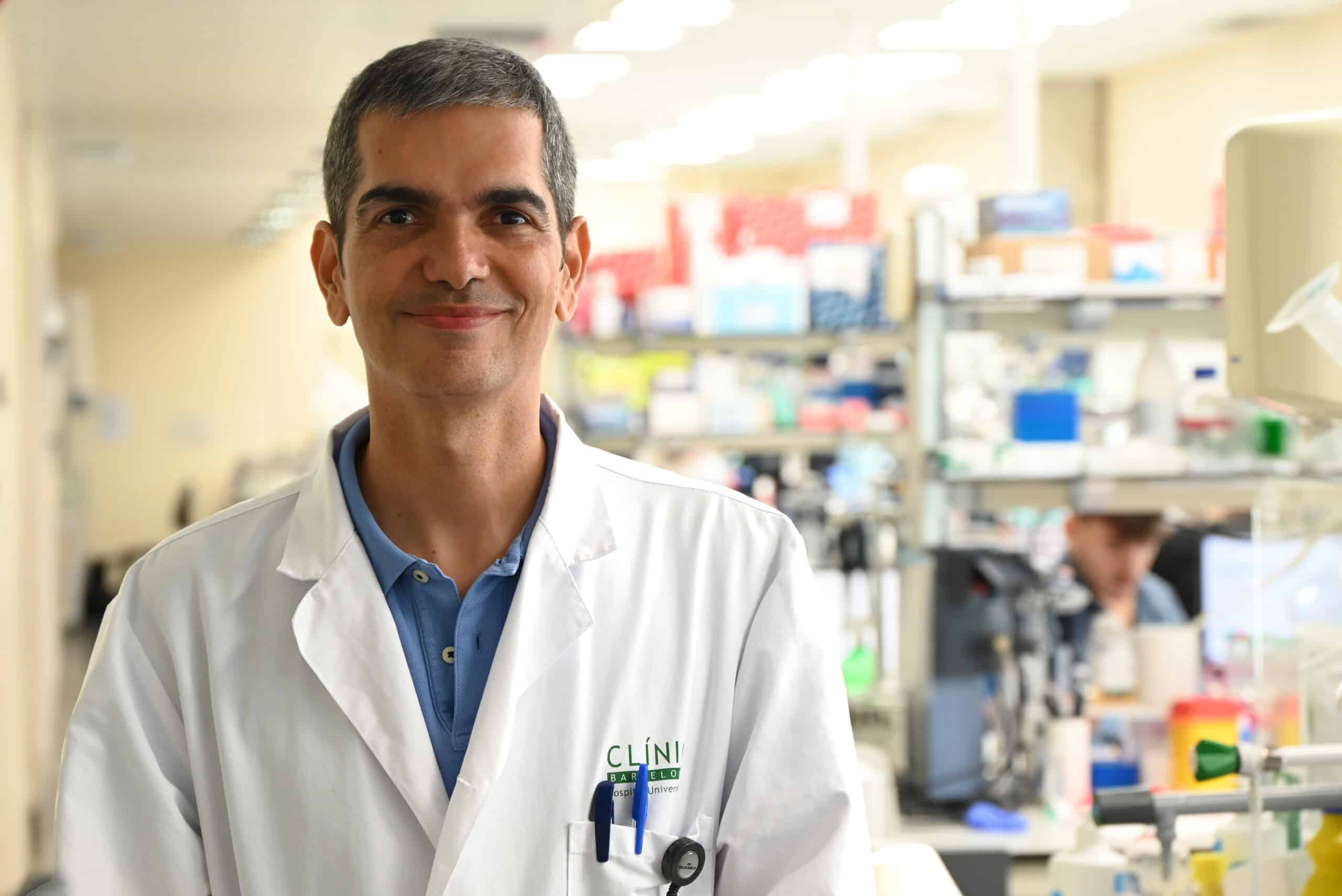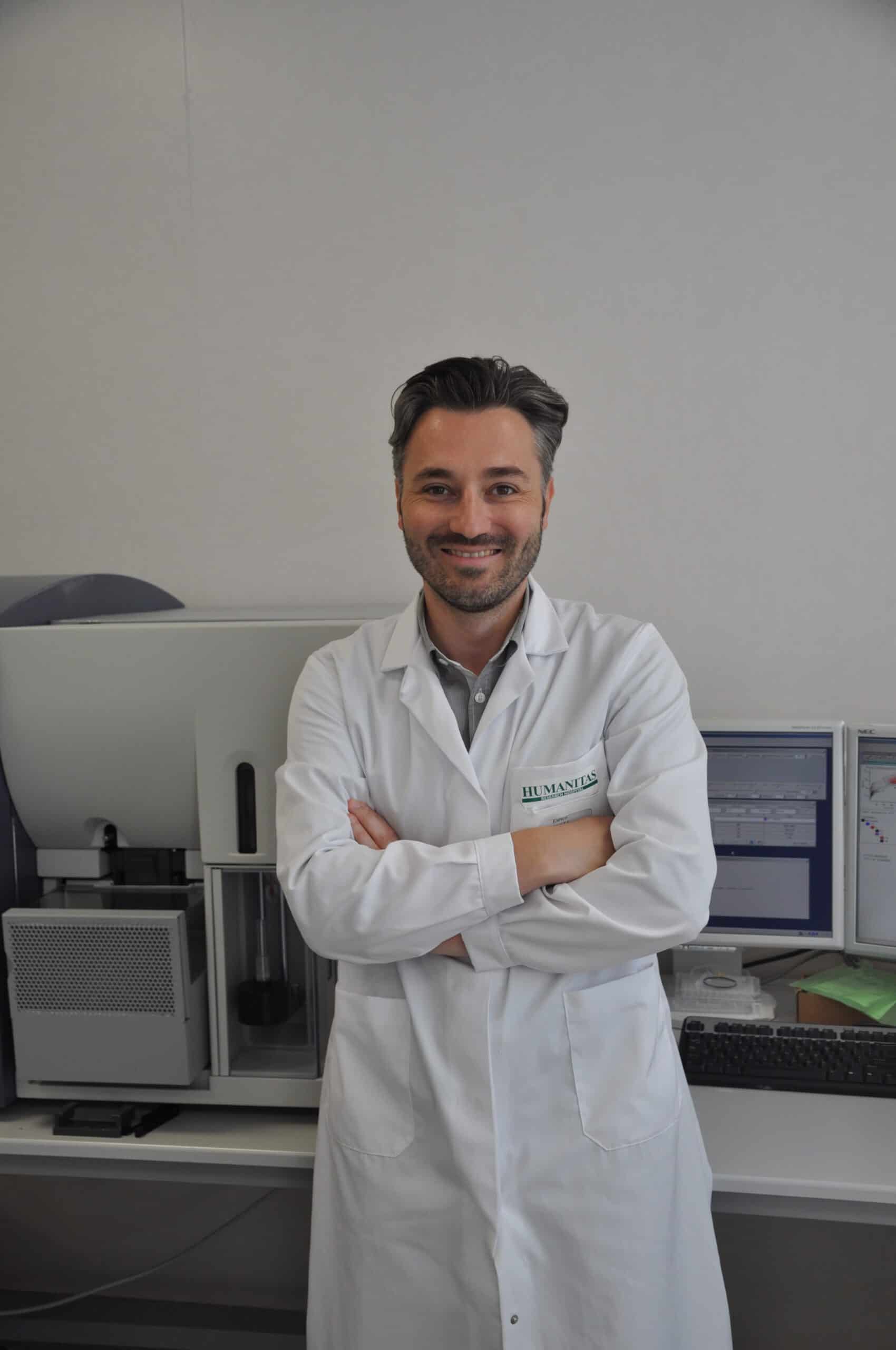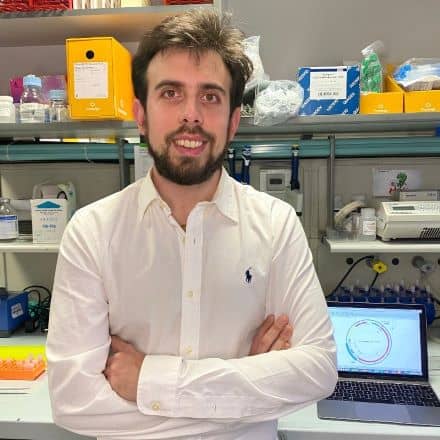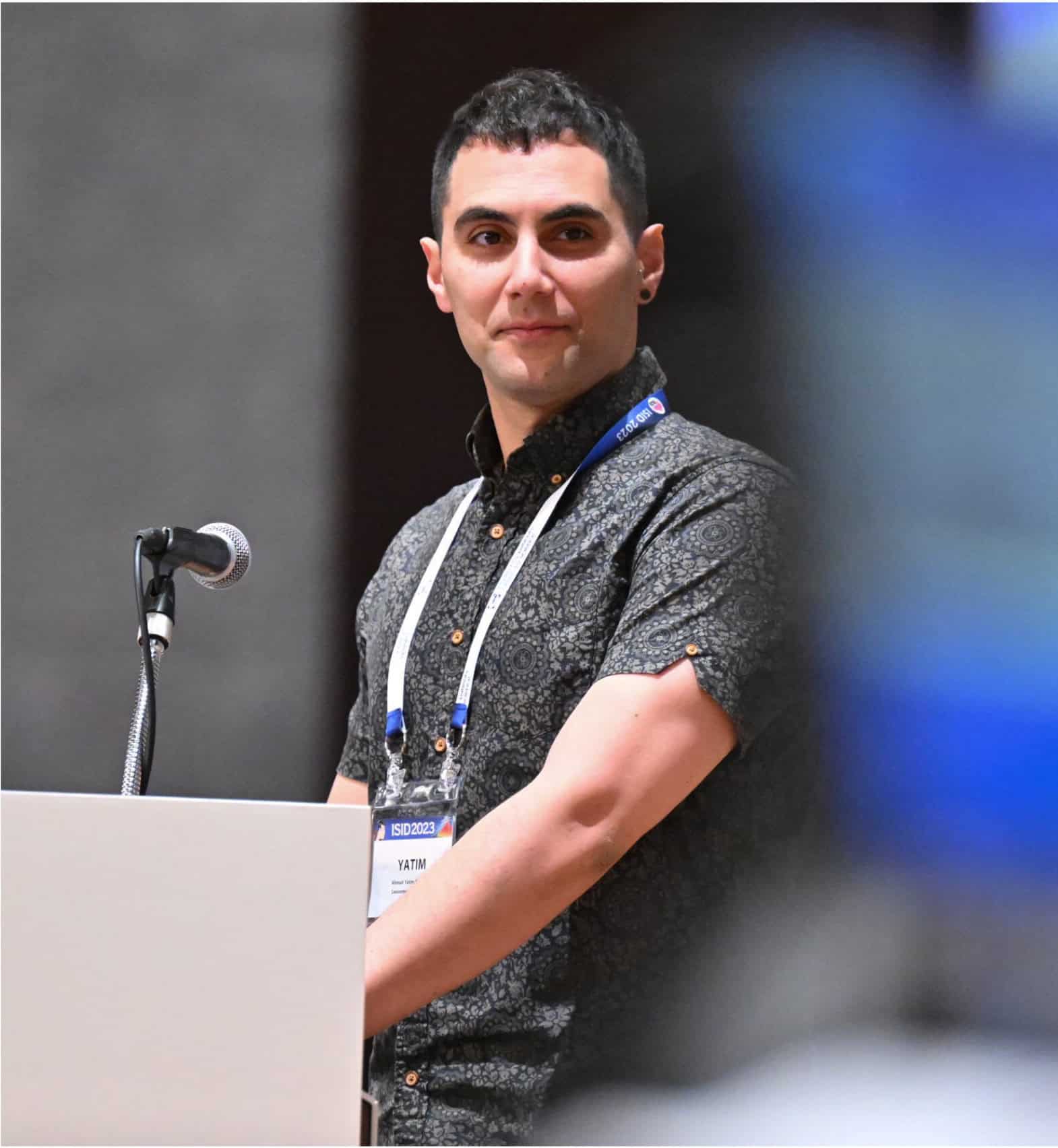CRI Funded Scientists
CRI invests in the brightest people with the best ideas all around the world.
These current and future scientific leaders in immunology and tumor immunology, from top academic research institutions, are advancing fundamental and applied discoveries that impact cancer research. From bench to bedside, CRI is ushering in the next generation of cancer immunotherapy innovations.
Search for CRI Funded Scientists using the filters below:

Merve Deniz Abdusselamoglu, PhD
The Rockefeller University
Postdoctoral Fellow

Judith Agudo, PhD
Dana-Farber Cancer Institute, Harvard Medical School
CRI Lloyd J. Old STAR

Ghamdan Al-Eryani, PhD
Broad Institute of MIT and Harvard
Postdoctoral Fellow

Hamza Furkan Alkan, PhD
The University of Texas Southwestern Medical Center
Postdoctoral Fellow

Elise Alspach, PhD
Saint Louis University School of Medicine
CLIP Investigator

Valsamo Anagnostou, MD, PhD
Johns Hopkins University School of Medicine
Clinical Accelerator, CLIP Investigator

Anca Apavaloaei, PhD
Weill Cornell Medicine
Postdoctoral Fellow

Camillia S. Azimi, PhD
Icahn School of Medicine at Mount Sinai
Postdoctoral Fellow

Hratch Baghdassarian, PhD
Massachusetts Institute of Technology
Postdoctoral Fellow

Lauren B. Banks, MD, PhD
Memorial Sloan Kettering Cancer Center
Postdoctoral Fellow

Marina Baretti, MD
Johns Hopkins University School of Medicine
Clinical Innovator

Alexandra Q. Bartlett, PhD
Oregon Health & Science University
Postdoctoral Fellow

Elisabeth M Battinelli, MD, PhD
Brigham & Women’s Hospital/Harvard Medical School
CLIP Investigator

Paul Beavis, PhD
The University of Melbourne (Australia)
CRI Lloyd J. Old STAR

Hannah Bell, PhD
University of Michigan
Postdoctoral Fellow

Matteo Maria Bellone, MD
Vita-Salute San Raffaele University
CLIP Investigator

Tamar Lea Ben Shaanan, PhD
University of California, San Francisco
Postdoctoral Fellow

Adam Blaisdell, MD, PhD
University of California, San Francisco
Postdoctoral Fellow

Lloyd Bod, PhD
Massachusetts General Hospital
CLIP Investigator

Jesse Boumelha, PhD
Icahn School of Medicine at Mount Sinai
Postdoctoral Fellow

Judith Bovee, MD, PhD
Leiden University Medical Center (Netherlands)
CLIP Investigator

Nadav Brandes, PhD
University of California, San Francisco
Postdoctoral Fellow

Joshua D. Brody, MD
Icahn School of Medicine at Mount Sinai
CRI Lloyd J. Old STAR

Jesusa Capera-Aragones, PhD
University of Oxford
Postdoctoral Fellow

Andrea B. Castro, PhD
University College London
Postdoctoral Fellow

Catalina Lee Chang, PhD
Northwestern University
CLIP Investigator

Sidi Chen, PhD
Yale University
CRI Lloyd J. Old STAR

Spencer Chen, PhD
Memorial Sloan Kettering Cancer Center
Postdoctoral Fellow

Edward Chuong, PhD
University of Colorado at Boulder
CRI Lloyd J. Old STAR

Alberto Ciccia, PhD
Columbia University
CRI Lloyd J. Old STAR

Jennifer L. Clarke, MD
University of California, San Francisco
Clinical Innovator

Joseph Collins, PhD
Boston Children’s Hospital
Postdoctoral Fellow

Guoliang Cui, PhD
Hefei Comprehensive National Science Center (China)
CRI Lloyd J. Old STAR

Tal Danino, PhD
Columbia University
CRI Lloyd J. Old STAR

Barsha Dash, PhD
La Jolla Institute for Immunology
Postdoctoral Fellow

Rebecca B. Delconte, PhD
Memorial Sloan Kettering Cancer Center
Postdoctoral Fellow

Julio Delgado, MD
Institut d’Investigacions Biomèdiques August Pi i Sunyer (Spain)
Clinical Innovator

Greg M. Delgoffe, PhD
University of Pittsburgh School of Medicine
CRI Lloyd J. Old STAR

Stanislav Dikiy, PhD
The Scripps Research Institute
Postdoctoral Fellow

Brianna Duncan-Lowey, PhD
Yale University
Postdoctoral Fellow

Gavin Peter Dunn, MD, PhD
Washington University School of Medicine
CRI Lloyd J. Old STAR

Luisa F. Escobar-Hoyos, PhD
Yale University
CLIP Investigator

Inaki Etxeberria, PhD
Memorial Sloan Kettering Cancer Center
Postdoctoral Fellow

Chiara Falcomatà, PhD
Icahn School of Medicine at Mount Sinai
Postdoctoral Fellow

Peter E. Fecci, MD, PhD
Duke University
CRI Lloyd J. Old STAR

Rita Leonor Fior, PhD
Champalimaud Foundation (Portugal)
Tech Impact Award

Ryan Flynn, MD, PhD
Boston Children’s Hospital / Harvard Medical School
CRI Lloyd J. Old STAR

Liuhui Fu, PhD
New York University School of Medicine
Postdoctoral Fellow

Giulia Furesi, PhD
Washington University School of Medicine
Postdoctoral Fellow

Thomas F. Gajewski, MD, PhD
University of Chicago
CLIP Investigator

Francesca Smylie Gazzaniga, PhD
Massachusetts General Hospital
CLIP Investigator

Nadia Guerra, PhD
Imperial College London
Tech Impact Award

Craig Haifer, PhD
St. Vincent’s Hospital Applied Medical Research Institute
Clinical Innovator

Malay Haldar, MD, PhD
University of Pennsylvania
CRI Lloyd J. Old STAR

Xue Han, PhD
Ohio State University
CLIP Investigator

Xin He, PhD
University of Wisconsin-Madison
Postdoctoral Fellow

Rachel S. Helms, PhD
La Jolla Institute for Immunology
Postdoctoral Fellow

Liam Hendrikse, PhD
University Health Network (Canada)
Postdoctoral Fellow

Michelle L. Hess, PhD
Brigham & Women’s Hospital
Postdoctoral Fellow

Ping-Chih Ho, PhD
Ludwig Institute for Cancer Research / University of Lausanne
CRI Lloyd J. Old STAR

Cheryl Ho, MD
Vancouver Cancer Centre
Clinical Accelerator

William H. Hudson, PhD
Baylor College of Medicine
Tech Impact Award

Iliyan D. Iliev, PhD
Weill Cornell Medicine
CRI Lloyd J. Old STAR

Md Torikul Islam, PhD
The University of Texas Southwestern Medical Center
Postdoctoral Fellow

Benjamin Izar, MD, PhD
Columbia University
CRI Lloyd J. Old STAR

Mingeum Jeong, PhD
Weill Cornell Medicine
Postdoctoral Fellow

Ning Jenny Jiang, PhD
University of Pennsylvania
CRI Lloyd J. Old STAR

Anusha Kalbasi, MD
Stanford University School of Medicine
CRI Lloyd J. Old STAR

Masakazu Kamata, PhD
University of Alabama at Birmingham
Tech Impact Award

Samantha B Kemp, PhD
University of Pennsylvania
Postdoctoral Fellow

Haydn T. Kissick, PhD
Emory University
CRI Lloyd J. Old STAR

Philip Kranzusch, PhD
Dana-Farber Cancer Institute
CRI Lloyd J. Old STAR

Nicholas F Kuhn, PhD
University of California, San Francisco
Postdoctoral Fellow

Ilia Kurochkin, PhD
Lund University (Sweden)
Postdoctoral Fellow

Emanuele Lettera, PhD
Memorial Sloan Kettering Cancer Center
Postdoctoral Fellow

Xiang Li, PhD
Boston Children’s Hospital
Postdoctoral Fellow

Chang Liao, PhD
University of California, San Francisco
Postdoctoral Fellow

Rik G.H. Lindeboom, PhD
The Netherlands Cancer Institute
Tech Impact Award

Enrico Lugli, PhD
Fondazione Humanitas per la Ricerca
CRI Lloyd J. Old STAR

Amanda Lund, PhD
New York University Medical Center
CRI Lloyd J. Old STAR

Helen MacKay, MD
Odette Cancer Centre Sunnybrook Health Sciences Centre
Clinical Accelerator

Robbie G. Majzner, MD
Dana-Farber Cancer Institute
CRI Lloyd J. Old STAR

Stacy Malaker, PhD
Yale University
CRI Lloyd J. Old STAR

Samuel C. Markson, PhD
Harvard Medical School
Postdoctoral Fellow

Nicholas Martin, PhD
University of California, San Francisco
Postdoctoral Fellow

Anukriti Mathur, PhD
University of Massachusetts Medical School
Postdoctoral Fellow

Courtney A. Matson, PhD
University of Minnesota
Postdoctoral Fellow

Domhnall McHugh, PhD
Memorial Sloan Kettering Cancer Center
Postdoctoral Fellow

Claire L. McIntyre, PhD
Brigham & Women’s Hospital/Harvard Medical School
Postdoctoral Fellow

Christopher B. Medina, PhD
Emory University
Postdoctoral Fellow

Yifat Merbl, PhD
Weizmann Institute of Science
CRI Lloyd J. Old STAR, Tech Impact Award

Maxime Meylan, PhD
Dana-Farber Cancer Institute
Postdoctoral Fellow

Alessandro Migliara, PhD
University of California, San Francisco
Postdoctoral Fellow

Megan S. Molina, PhD
University of Washington
Postdoctoral Fellow

Alexandra G. Moyzis, PhD
Salk Institute
Postdoctoral Fellow

Kat Mueller, PhD
Children’s Hospital of Philadelphia
Postdoctoral Fellow

Kevin Ng, PhD
The Rockefeller University
Postdoctoral Fellow

Xiaohan Ning, PhD
Dana-Farber Cancer Institute
Postdoctoral Fellow

Norihide Jo, MD, PhD

Chinaemerem U. Onyishi, PhD
National Institute of Allergy and Infectious Diseases, National Institutes of Health
Postdoctoral Fellow

David L. Owen, PhD
Harvard Medical School
Postdoctoral Fellow

Joseph Palmeri, PhD
Memorial Sloan Kettering Cancer Center
Postdoctoral Fellow

Sara Martina Parigi, PhD
The Rockefeller University
Postdoctoral Fellow

Seongyeol Park, MD, PhD
Stanford University
CRI Dr. Keith Landesman Memorial Immuno-Informatics Fellow

Parasvi Patel, PhD
Massachusetts General Hospital
Postdoctoral Fellow

Karin Pelka, PhD
The J. David Gladstone Institutes
Tech Impact Award

Xiong Pi, PhD
Boston Children’s Hospital
Postdoctoral Fellow

Josep Maria M. Piulats, MD, PhD
Fundacio Institut D’Investigacio Biomedica de Bellvitge, L’Hospitalet del Llobregat
CLIP Investigator

Luke Postoak, PhD
Washington University School of Medicine
Postdoctoral Fellow

Bruce W. Robinson, MD, PhD
Tech Impact Award

Samuel A. Rose, PhD
Memorial Sloan Kettering Cancer Center
Postdoctoral Fellow

Kole T. Roybal, PhD
University of California, San Francisco
CRI Lloyd J. Old STAR

Marco Ruella, MD
University of Pennsylvania
CLIP Investigator

Brian Ruffell, PhD
Moffitt Cancer Center
CRI Lloyd J. Old STAR

Ayana T. Ruffin, PhD
Emory University
Postdoctoral Fellow

Ansuman T. Satpathy, MD, PhD
Stanford University
CRI Lloyd J. Old STAR

Andrea Schietinger, PhD
Memorial Sloan Kettering Cancer Center
CRI Lloyd J. Old STAR

Mark A. Sellmyer, MD, PhD
University of Pennsylvania
CRI Lloyd J. Old STAR

Lewis Zhichang Shi, MD, PhD
University of Alabama at Birmingham
CLIP Investigator

Raymond Shim, PhD
University of Calgary
Postdoctoral Fellow

Bilal A. Siddiqui, MD
The University of Texas MD Anderson Cancer Center
Clinical Innovator

Felipe Silva Rodrigues, PhD
The Rockefeller University
Postdoctoral Fellow

Maria Sirenko, PhD
New York University School of Medicine
Postdoctoral Fellow

Craig L. Slingluff, Jr., MD
University of Virginia Health System
CLIP Investigator

Kellie N. Smith, PhD
Johns Hopkins University School of Medicine
CRI Lloyd J. Old STAR

Matija Snuderl, MD
New York University School of Medicine
CLIP Investigator

Gregory F. Sonnenberg, PhD
Weill Cornell Medicine
CRI Lloyd J. Old STAR

Matthew H. Spitzer, PhD
University of California, San Francisco
CRI Lloyd J. Old STAR

Harrison Sudholz, PhD
University of California, Berkeley
Postdoctoral Fellow

Linyu Sun, PhD
Brigham & Women’s Hospital/Harvard Medical School
Postdoctoral Fellow

Thornton W. Thompson, PhD
University of Washington
Postdoctoral Fellow

Anna Tinker, MD
Vancouver Cancer Centre
Clinical Accelerator

Ahmet Bugra Tufan, PhD
Boston Children’s Hospital
Postdoctoral Fellow

Aldo Ummarino, MD, PhD
Boston Children’s Hospital
Postdoctoral Fellow

Marcel van den Brink, MD, PhD
Memorial Sloan Kettering Cancer Center

Aaron van Loon, PhD
University of Washington
Postdoctoral Fellow

Vivek Verma, PhD
University of Minnesota
CLIP Investigator

Alejandro V. Villagra, PhD
Georgetown University
CLIP Investigator

Rosa Vincent, PhD
Baylor College of Medicine
Postdoctoral Fellow

Robert H. Vonderheide, MD, DPhil
University of Pennsylvania Abramson Cancer Center
Clinical Accelerator

Peter Wang, PhD
Massachusetts General Hospital
CRI Dr. Keith Landesman Memorial Fellow

Xiaoyang Wu, Ph.D.
University of Chicago
Tech Impact Award

Man Wu, PhD
Boston Children’s Hospital
Postdoctoral Fellow

Tuoqi Wu, PhD
University of Texas Southwestern Medical Center
CRI Lloyd J. Old STAR

Yun Xia, PhD
Massachusetts General Hospital
Postdoctoral Fellow

Kai Kun Xie, PhD
Weizmann Institute of Science
Postdoctoral Fellow

Yi Yang, PhD
University of Pennsylvania
Postdoctoral Fellow

Nader Yatim, MD, PhD
Icahn School of Medicine at Mount Sinai
Postdoctoral Fellow

Ahmad Yatim, MD, PhD
The Rockefeller University
Postdoctoral Fellow

Jianhang Yin, PhD
University of California, San Francisco
Postdoctoral Fellow

Dmitriy Zamarin, MD, PhD
Icahn School of Medicine at Mount Sinai
Clinical Accelerator

Ivan Zanoni, PhD
Boston Children’s Hospital
CRI Lloyd J. Old STAR

Qiming Zhang, PhD
Massachusetts Institute of Technology
Postdoctoral Fellow

Qilin Zhang, MD
Massachusetts General Hospital
CLIP Investigator

Haiwei Zhang, PhD
Boston Children’s Hospital
Postdoctoral Fellow

Jing Zhang, PhD
Memorial Sloan Kettering Cancer Center
Postdoctoral Fellow

Ze Zhang, PhD
University of Massachusetts Medical School
Postdoctoral Fellow

Yang Zhao, PhD
Stanford University
Postdoctoral Fellow